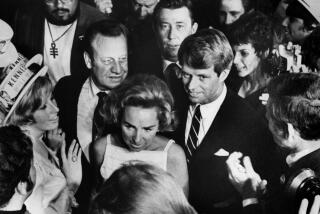Jackie Kennedy, warts and all
- Share via
A newly released series of interviews with Jacqueline Kennedy, recorded in 1964, just months after President John F. Kennedy was assassinated, offers an extraordinary and occasionally shocking glimpse of a woman enshrined in our popular culture as a figure of grace, fortitude and civility. In the conversations, the then-34-year-old widow reveals herself as variously audacious, narrow-minded and unsparingly tart. She called Indira Gandhi “a real prune — bitter, kind of pushy,” and said she had told Soviet Premier Nikita Khrushchev at a dinner to stop boring her with statistics on Ukraine. (He laughed.)
After being told by her husband of some of the Rev. Martin Luther King Jr.’s alleged sexual peccadilloes after “that freedom march thing,” she called the civil rights leader “a phony.” She declared that women should never be in politics — “we’re just not suited to it” — and recalled that she told an interviewer, “I get all my opinions from my husband” (all evidence here to the contrary).
As her daughter, Caroline Kennedy, has said in television interviews this week, these conversations, released Wednesday, portray her mother at one specific point in time. (The younger Kennedy said that even her own daughters were “horrified” by some of the things their grandmother said.)
Certainly the more politically incorrect remarks make up only a small part of her wide-ranging observations on politicians, politics and her family. She poignantly recalls her husband weeping in the bedroom over what the failure of the Bay of Pigs invasion would mean for the Cuban exiles involved. Jacqueline Kennedy Onassis went on to become a book editor and a patron of the arts. She once lamented that women were not encouraged to use their full gifts.
Most of our idols have flaws. But in a family that has ruthlessly guarded the images of President Kennedy and his wife and presented them both as admirable and heroic, it is significant and commendable that Caroline Kennedy would allow the release of these interviews, showing a fuller, more complex, sometimes disconcerting, even disappointing picture of her mother. The subject herself, who died in 1994, was famously controlling of her public image, instructing in her will that her children “make every effort to prevent publication of her personal papers, letters and writings,” according to her daughter’s thoughtful forward to the book. These particular interviews were always going to be made public eventually, but Caroline Kennedy’s decision to publish them as part of the commemoration of the 50th anniversary of JFK’s presidency was a brave one. At a time when there could have been only hagiographic reminiscences, this is a compelling and necessary contribution to a fuller portrait of the Kennedy years.
More to Read
Sign up for Essential California
The most important California stories and recommendations in your inbox every morning.
You may occasionally receive promotional content from the Los Angeles Times.










